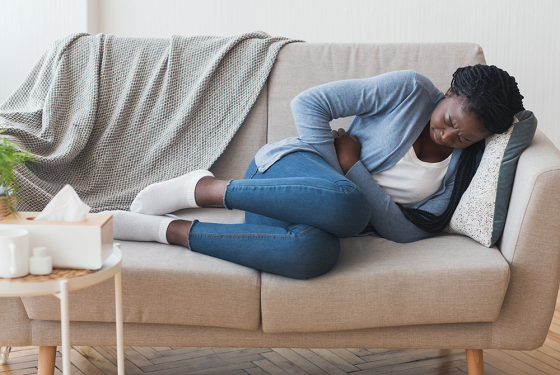
Do I have uterine fibroids?
Fibroids are abnormal growths that develop on the walls of the uterus. Doctors may call them myomas or leiomyomas.
They are often benign which means they do not contain cancer cells. This means that if you get them, this does not mean that they will cause uterine cancer.
They can grow as one tumor or several masses and they can be located in different parts of the uterus.
In terms of size, they can be the size of a small seed or as big as a watermelon. In rare cases, they can become quite large that they expand the uterus to the point of reaching the rib cage.
The 4 types of fibroids
The uterine fibroids are categorized based on their location in or on the uterus.
Intramural fibroids: This is the most common type. They develop within the muscular wall of the uterus. They sometimes grow large and can expand your womb.
Subserosal fibroids: These grow outside of the uterus. If they grow larger, they may make one side of your uterus appear bigger.
Pedunculated fibroids: These types of fibroids form when subserosal fibroids develop a stem or a base that supports the tumor.
Submucosal fibroids: These develop in the middle of the muscle layer in the uterus. These types of fibroids are rare.
What causes fibroids?
There is a common belief that contraceptive use can cause fibroids. This is a myth. Younger women who have never used contraceptives also develop fibroids.
The cause of fibroids is not yet known. However, doctors believe that several factors including hormones, family history, and pregnancy.
There are no known ways to prevent fibroids. Doctors recommend getting regular pelvic exams and regular monitoring.
How common are they?
Yes, they are actually quite common in women of reproductive age. Studies show that about 40% to 80% of women have fibroids. Many women will have uterine fibroids at some point in their lives.
What are the signs you have fibroids?
Some women may not actually know that they have uterine fibroids. In most cases, doctors will accidentally discover these tumors during a pelvic exam or prenatal ultrasound.
Some women have symptoms and these are influenced by the location, size, and how many fibroids there are.
The most common symptoms are:
- Heavy periods
- Periods lasting more than 7 days
- Frequent urination
- Feeling pressure or pain on the pelvic
- Having difficulties urinating
- Constipation
- Lower back pain or leg pains
Can you get pregnant if you have uterine fibroids?
Yes. Many women with uterine fibroids can get pregnant.
The most important thing is close monitoring by your healthcare provider. Hormones released during pregnancy can, in rare cases, make the fibroids grow bigger. In some cases, enlarged fibroids can make it hard to maintain a pregnancy.
In some cases, they have been linked to infertility as some infertile women have been found to have uterine fibroids.
In other cases, changes in the size and shape of the uterus can interfere with the entry and movement of sperm.
Fibroids can also block fallopian tubes making it hard for the embryos to implant.
Is there treatment for uterine fibroids?
Yes.
Treatment depends on the size of the fibroids, number, and where it is located in the uterus. The symptoms causing it may also determine the treatment needed. The treatment options include medications, contraceptive pills, IUDs, and fibroid surgery. Your doctor will recommend the best treatment option.
If you are not experiencing any symptoms, you may not need treatment. However, it is important to be closely monitored over time.
In some women, fibroids can shrink or go away on their own. This is common during menopause due to a decrease in hormones.
Do you have any questions about uterine fibroids, talk to us in the comments section.

Very educative
Very educative
Thank you, Judy!
Thank you, Judy!
Excellent advise
Excellent advise
When you have an implant of…
When you have an implant of five years and you don’t get your periods does it show that you have fibroids?
Hi Ruth,
Not it does not…
Hi Ruth,
Not it does not. One of the side effects of the hormonal implant is that most women on the implant get lighter periods, or their periods stop altogether while they have the implant. This mostly happens in the first 6-12 months. However, some women stop getting a period at all so it is totally normal as well. When the implant is removed, it can also take a few months for your period to go back to the cycle you had before you got the implant. However, if you have concerns, visit the doctor so that this can be investigated further.
Have got prolonged periods…
Have got prolonged periods,frequent urinations with pains that has got thick discharges. Does it mean have got fibroids?
And can normal infection that has stayed for so many years trigger fibroids in a long run treatment?
Hi Maria,
First, it is not…
Hi Maria,
First, it is not yet known what causes fibroids. With regards to the prolonged periods, visit the doctor immediately to have that checked. It does not sound like something you should ignore anymore.